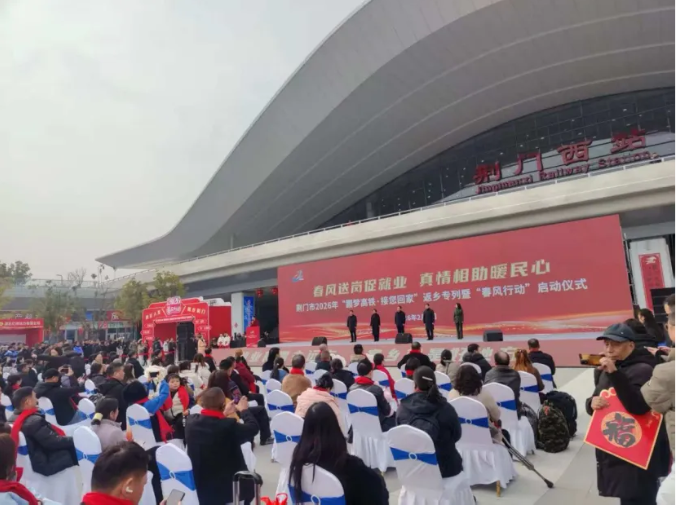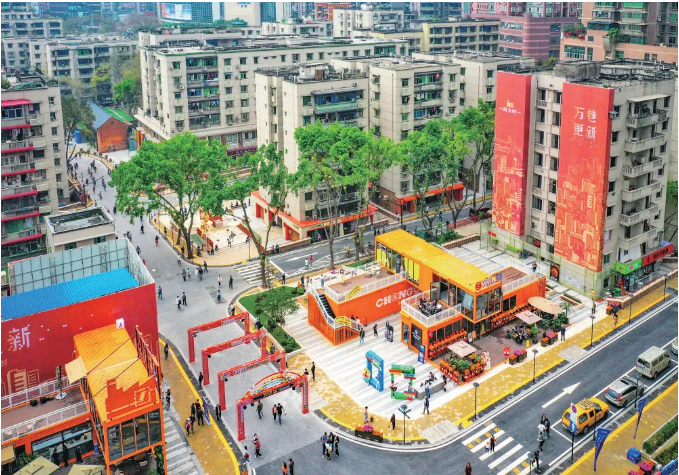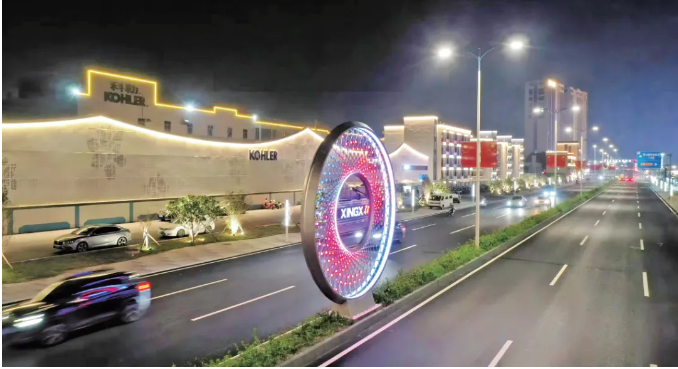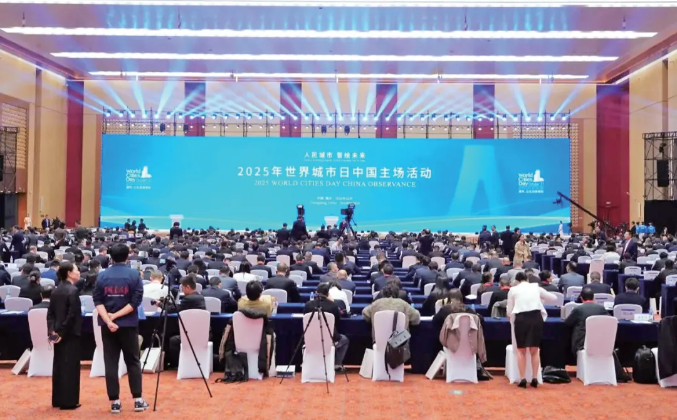图片 Image: © Daria Scagliola
MVRDV 设计的「矩阵一号 Matrix One」办公实验楼现已完工。「矩阵一号」位于阿姆斯特丹科技园的中心位置,是矩阵创新中心 (Matrix Innovation Center) 的核心枢纽。建筑共六层楼高、面积达13,000平方米,为园区提供了重要的社交空间和便利设施。至关重要的是,该项目还推动了可持续设计的发展:从可拆卸结构、“社交楼梯”、太阳能发电、智能照明,到大量的自行车停车位,设计的各个角度都融入了可持续思维。「矩阵一号」满足了阿姆斯特丹实现节能目标的雄心壮志,并获得了BREEAM绿色建筑评估体系优异认证 (BREEAM-Excellent)。空间的使用者——阿姆斯特丹大学的SustainaLab本身也是可持续发展技术的专业研究机构。
The construction of Matrix One, the MVRDV-designed laboratory and office building in the heart of Amsterdam Science Park, is now complete. Serving as the main hub of the Matrix Innovation Center, the six-storey, 13,000-square-metre building provides the campus with key social spaces and amenities. Crucially, the project also pushes the envelope in sustainable design: from demountable construction, the “social stairs”, and solar energy generation to smart lighting and generous amounts of bicycle parking, it incorporates sustainable thinking from every possible angle. Matrix One meets ambitious Amsterdam targets for energy use and is certified BREEAM-Excellent. The building's users are also working on sustainability solutions: the University of Amsterdam’s SustainaLab works here on technologies for a sustainable future.
图片 Image: © Daria Scagliola
「矩阵一号」是矩阵创新中心内七座建筑中规模最大的一栋,创新中心坐落于阿姆斯特丹科技园内,这里聚集着诸多的科学家和科技企业家们,共同为当今和未来将面临的全球性问题寻找可持续的解决方案。建筑本身包含科学实验室,并为如高通公司 (Qualcomm) 这类的科技公司提供办公空间,还有像阿姆斯特丹大学的可持续发展研究机构 SustainaLab、清洁能源公司 Photanol、碳捕集技术公司 Skytree 和初创的食品科技公司FUL Foods 这类致力于可持续发展的机构和企业入驻。
Matrix ONE is the largest of seven buildings that now make up the Matrix Innovation Center, part of Amsterdam Science Park, where scientists and entrepreneurs work on sustainable solutions for current and future problems. Matrix One itself contains a mixture of science laboratories and offices for tech companies including Qualcomm, while other tenants including the University of Amsterdam's SustainaLab, Photanol, Skytree, and the startup FUL Foods also work in Matrix ONE to develop technologies for a sustainable future.
图片 Image: © Daria Scagliola
图片 Image: © Daria Scagliola
作为矩阵创新中心的主要建筑,「矩阵一号」旨在为阿姆斯特丹科技园、乃至其他地区的建筑树立可持续发展的典范。建筑采用了可拆卸的设计,使用了螺钉和螺栓等简单的连接方式,在未来需要更新配件时,可以将其拆卸并循环利用。此外,建筑的楼板使用了未设置固定连接的预制混凝土板,建筑在到达使用寿命后,可以将楼板移除并重新利用。在线材料数据平台Madaster为建筑提供了一个全面的材料“护照”系统,记录并呈现了建筑所使用的材料和产品,以及120,000余个单独组件的二氧化碳储存量。建筑物超过90%的建筑材料都可以在未来再次使用。
As the main building of the Matrix Innovation Center, Matrix One aims to be a sustainable example for the other buildings in Amsterdam Science Park and beyond. The building is designed to be demountable. Simple connections such as screws and bolts allow elements to be detached and reused when various parts of the building are updated; even the building’s floors are made using prefabricated concrete slabs with no fixed connections, allowing them to be reused at the end of the building’s lifespan. The platform Madaster provides a comprehensive material passport system to give insight into the materials and products used and the CO2 storage for over 120,000 individual components. As a result, over 90% of the building’s materials can be reused again later.
可拆卸的设计和全面的材料“护照”系统意味着90%的建筑材料都可以被回收利用
The building's demountable design and comprehensive material passport system mean that over 90% of the building's materials can be reused
建筑的屋顶上铺设了1,000平方米的太阳能电池板,满足建筑部分的能源需求,同时,联网控制的照明和加热装置有助于减少能源消耗,其中重要的实验室设备都采用独立电路系统供电。结合能源自生产和降低能源消耗,建筑可以实现大部分所需能源的自给自足,由此满足阿姆斯特丹的节能目标。
On the roof, 1,000 square metres of solar panels generate a portion of the building’s energy, while internet-connected lighting and heating fixtures help to reduce energy consumption (power for critical lab equipment runs on a separate circuit). With this combination of energy generation and reduced energy consumption, the building itself produces a significant proportion of the energy it consumes, and therefore meets the ambitious Amsterdam targets for energy performance.
图片 Image: © Daria Scagliola
作为矩阵创新中心的主体建筑,「矩阵一号」同时也是园区的社交中心。紧邻建筑南角主入口的大型“社交楼梯”是MVRDV为其设计的一个关键元素,设计的核心理念旨在通过这条“社交楼梯”延续贯穿园区的曲折路径。楼梯上设置了用于演讲的论坛式座椅、和非正式会议时可使用的桌子和咖啡站,这些功能将来自不同行业的员工聚集在一起,激发人与人之间的交流和分享。
As the main building of the Matrix Innovation Center, Matrix One serves as the social hub of the campus. A key element of MVRDV’s design is the large “social staircase” immediately next to the main entrance on the building’s southern corner, which is conceptualised as a continuation of the zig-zagging paths that are found throughout the campus. With tribune-style seating for presentations, tables for informal meetings, and coffee stations, these stairs bring together workers from different industries, allowing them to mingle and share ideas.
图片 Image: © Daria Scagliola
楼梯空间的设计由MVRDV与up architecture合作完成,通过外墙上的玻璃立面,人们可以看到楼梯空间内郁郁葱葱的绿色墙壁,其他部分的墙面则采用了柔软的毛毡饰面,极大地减少了声音混响,为这个特别的社交空间营造平静而亲密的氛围。
The interior design for this space, developed by MVRDV in collaboration with up architecture, includes multiple lush green walls that are visible through the glass façade, while soft felt finishes elsewhere dramatically reduce sound reverberation, lending the social spaces a calm and intimate atmosphere.
图片 Image: © Daria Scagliola
图片 Image: © Daria Scagliola
“社交楼梯”与大楼其他的设施相辅相成,一楼设置了餐厅,顶层空间有一家酒吧。这些社交功能形成了“俱乐部矩阵”,可供楼内和矩阵创新中心的所有员工使用。此外,「矩阵一号」还囊括了一个设有100个座位的礼堂,人们可以在这里分享和交流,强化了建筑作为知识枢纽的重要角色。
This social staircase is complemented by the building’s amenities, with a ground floor restaurant and a bar at the top of the staircase. These social features form “Club Matrix”, available for use by workers from all of the surrounding Matrix buildings. The building also includes an 100-seat auditorium, confirming Matrix One as a central hub for the creation and sharing of knowledge.
图片 Image: © Daria Scagliola
图片 Image: © Daria Scagliola
图片 Image: © Daria Scagliola
“「矩阵一号」是一个很好的实验机会,我们在过程中测试了MVRDV长期研究的若干减碳策略”,MVRDV合伙人Frans de Witte说道,“这座建筑已经达到了最先进的标准,但同时,技术在不断地革新,标准也是不断升级的,因此,我们尽可能地灵活处理内部空间和对应的技术装置;办公室可以很容易地被改造为实验室,反之亦然,实验室也可以通过新的系统进行快速升级,以适应不断变化的标准。未来几十年后,当这座建筑到达了使用寿命,它将成为其他建筑的材料来源。我们希望这也能成为未来所有建筑设计的一个标准,很高兴看到「矩阵一号」也为MVRDV的可持续设计标准再树新高”。
“Matrix One offered an excellent opportunity for us to test a number of the carbon-reduction strategies we have long been investigating at MVRDV”, says MVRDV partner Frans de Witte. “The building is state-of-the-art now, but it also acknowledges that the state-of-the-art is constantly changing. So we made both the interior spaces and the technical installations that serve them as flexible as possible; offices can easily be modified to become labs and vice versa, and labs can be easily upgraded with new systems to accommodate changing standards. In the decades to come when the building is no longer cutting-edge, it will become a source to harvest materials from for other buildings. In the future, we hope this is how all buildings will work – and we’re excited to see Matrix One become a standard-bearer in our own office.”
图片 Image: © Daria Scagliola
图片 Image: © Daria Scagliola
除了在建设和运营中减少碳消耗的措施外,「矩阵一号」还鼓励用户践行健康可持续的生活方式:“社交楼梯”占据明显的位置,而电梯则设置在较深处的空间,需要通过中庭进入,这样可以引导人们更多使用楼梯。
In addition to the measures to reduce carbon consumption in the construction and operation of the project, the building also encourages users to lead a healthy and sustainable lifestyle: the location of the social stair encourages people to use the stairs instead of the elevators, which are found deeper inside the building, accessed via the atrium.
图片 Image: © Daria Scagliola
在建筑背后的次入口处则设置了通往自行车停车库的通道,鼓励大楼里的工作人员使用骑自行车通勤。「矩阵一号」采用了诸多可持续和健康措施,并已获得BREEAM绿色建筑评估体系优异认证 (BREEAM-Excellent)。
On the rear of the building, a secondary entrance includes access to a bicycle parking facility, encouraging those who work in the building to cycle instead of driving. As a result of all of these sustainability and health measures, the building has received BREEAM-Excellent certification.
图片 Image: © Daria Scagliola
图片 Image: © Daria Scagliola





发表评论 取消回复